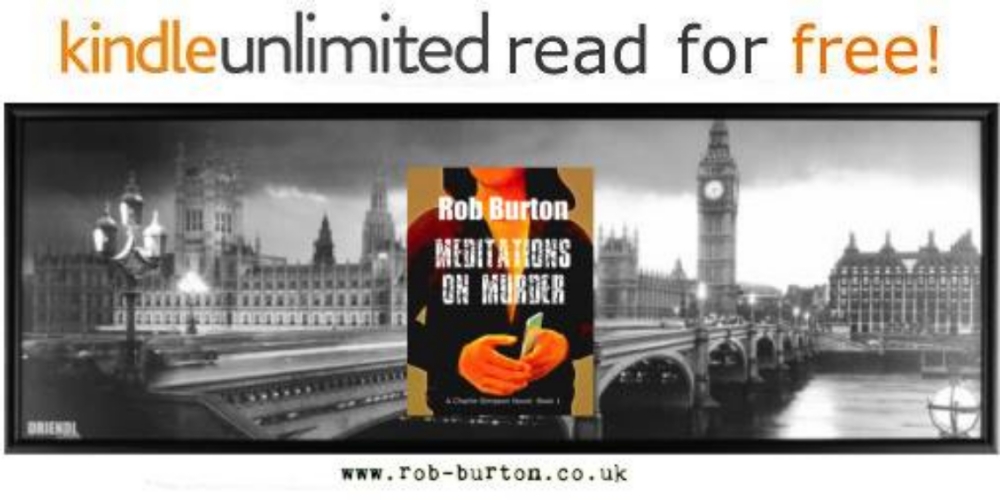How do I become a writer?
Rob Burton
How do I become a writer? This is a question that’s raised ad infinitum on the Facebook writer’s pages I haunt on a regular basis. We could also ask when did you become a writer? That’s another interesting question and a pertinent one because it’s the one I’ll answer here.
As my mind is currently a biologically-based analogue memory system I cannot pinpoint for you the exact moment my first story got a gold star from my teacher at school. What I do know is I always created good stories at school, my essay and creative work always achieved good marks and comments. I’m not saying that English was my favourite subject as I can’t remember even one of my teacher’s names, let alone what the lessons were about. What I can remember is being expelled from History class for ‘asking too many questions’ and I won a prize for metalwork – which was a prescient omen for my fast approaching future.
I wasn’t even one of those kids who spent their time in some sort of daydream, writing about unicorns or the ghosts they could see stood in corners of their bedrooms, or penning odes to their dog. I was one of those kids who bunked off from school to sit in the public library inhaling the books. When I wasn’t in the library I was reading the sauce bottles on the table at home, the cereal box, and anything I could get my hands on.
As a child in the 1960s my reading consisted of the traditional children’s books such as Enid Blyton’s Famous Five/Secret Seven series, Arthur Ransome’s Swallows and Amazons and classics like Swiss Family Robinson and Treasure Island. As I got older I became consumed by Second World War books such as Coldiz, Reach for the Sky and the likes. About that time, I also discovered the treasure trove of charity and second-hand book shops where I could spend my paper-round money.

Upon leaving my shite Secondary Modern School for Boys with no decent exams to my name and no idea of how to interact with girls, because the only ones I knew were my sisters, I fulfilled my metalworking prize destiny––I became an apprentice in a government rocket factory. (I can’t tell you any more because I signed the Official Secrets Act and I’d have to kill you)
As an engineering apprentice on a City and Guilds course one of the things you had to do was a day release at the local college. While most of the day was spent in the engineering workshops we also had a period of “general studies”. This was probably because as engineering apprentices we were looked upon as uneducated oiks who were good with their hands but whose brains needed a bit of extra maintenance.
For this part of the course we were given homework. Most often, this homework was in the form of writing something or other. I do remember one essay was about comparing marriage to a horse and cart. I think the teacher was expecting an essay vaunting the joys of man and women working together in perfect unison as they experienced wedded bliss. My approach (and I wasn’t even married, and was probably around seventeen at this time) was more jaundiced. Placing the happy bride in bridles and harnesses with the husband being the driver, whip in hand. It might well have surprised the teacher but I got good marks.
It was another essay that sowed seeds, not only of writing but about doing more with my future. I can’t, for the life of me, remember what it was and it could very well be the one I mention above – who knows? Anyhow, I was asked to meet with another teacher who turned out to be the Head of the English Department in the college. He praised me for my writing and made the suggestion that, if I could, I should apply for, and join, the colleges A Level English course. Wow. I was stoked. Someone, a senior teacher, was praising me for something I had written.
I rushed home to tell my Mother and Father about this fantastic opportunity. ‘Oh no, no, no no, no,’ they droned, ‘You have to get your trade, you signed your five-year apprenticeship papers, oh no, no, no, no no’, or words to that effect. Such are one’s teenage dreams crushed upon the rocks of parental discouragement. If I was one of those successful London writers, I would have, ‘Dick Whittington style’, packed my spotted hanky and made my way to London to become a successful writer for the NME or Sounds. But, I didn’t.
What I did do was stand in my stinking overalls and start writing poetry. In the tradition of other working-class writers, most of my poetry was about being a worker, being working class and being angry about it. I had also got interested and active in politics, both local and global. I was a member of CND, Greenpeace and had started to read about political theories. I’d also learned how to talk to girls, if you were worried about that – another outlet for my poetry – it made me windswept and interesting and hopefully got me laid––I can’t remember. At this juncture I probably should provide you with a verse or two of my early poetry. I do have them, they are safe in a little notebook, under the stairs, in my house, in Plymouth. But I’m in China so you’re out of luck! Soz.
As I mentioned, people, often young people ask: How do I become a writer? I tell them to do what I did and take Jack Kerouac’s advice and go ‘On the Road’. Travel, do something interesting and exciting, generate memories and have adventures. Then, my daughter, you will have something to write about.
So I emigrated to South Africa. Yes, it was the mid-70s, Yes, it was mid-apartheid and yes, although I was ‘Mr Right On Politics’, no one had told me. But, that’s another story (which is written and you might see here at a later date)
I eventually returned to the UK and ended up back in a factory in Bridgwater, Somerset. I picked up on my political leanings, became more active in the Trade Union and Labour Movement, I even wrote a few articles for the local hand-produced political magazine – the first things I ever got published. Being a part of the Labour movement also meant I was meeting people outside of my usual social environment. They were teachers, artists, and even writers. At first I was a little intimidated because I felt like a working-class oik who didn’t have much to say to them. I soon came to realise that, actually, these teachers and creatives were just people.
I started to think about writing more seriously. So seriously that I faked a back injury at work and spent two weeks in front of a typewriter. (look it up, it’s an old-fashioned way of writing stories). I’d picked it up second-hand somewhere and began bashing out stories that I then tried to sell to comic and magazine editors. Yes, this was my first experience of the rejection slip. Notwithstanding that, I was having more luck getting articles in other (non-paying) magazines and it was a thrill to see my name in print.
Then I had an epiphany moment. At work, I was the shop steward for the union and my bosses thought I was disruptive. For whatever reason, a couple of industrial psychologists turned up at work wanting volunteers for some project or other. I volunteered. Whatever the reason, during the face-to-face interviews I disclosed that I was considering applying to the Trade Union college for a degree but I was concerned as I didn’t have A levels for it. What Dr Kettle told me (I remember his name because he changed my life) was that in terms of my IQ and the other stuff they tested for, I was in the top ten percent quartile of their standard deviation curve. This, I was told, clearly suggested that I had the ability to be successful in higher education.
By then, I was somewhere in my 30’s. I took this advice seriously, went to night school, got an English A level and applied for a place, as a mature student, at what was then Plymouth Polytechnic, but which is now Plymouth University. I told my parents of this fantastic change of direction in my life. They droned, ‘oh, no, no, no, no, no no, what about your career? Oh, no, no, no, no, no’.
I said, “Mum I don’t have a career, I have a job!” And the rest is history.
So lots of writing essays, and earning PhD’s later, I worked as a lecturer and researcher, which also meant lots of academic writing. This, for me, was a joy as it’s still ‘creative writing’ in my book, not the statistics, obviously, but the words.
I attempted my first novel, sitting cosily in my office when no one was looking. That has disappeared into whereever electronic media disappears to. It might be on a CD Rom or floppy-disk under the stairs. Who knows?

It was working and living in China that gave me the actual time, space and impetus to do more serious writing. Here, I have written a number of novels, some texts books, and a memoir of my first five years in the country. I also now write for the local expat English language newspaper, run by the main Chinese newspaper, and I also write for RedStar, an expat magazine here in Hangzhou. I have written model IELTS answers for training schools and am currently proofreading English for Zhejiang TV and the 2022 Asian Games magazine.
Meanwhile, I also write short stories, poems and articles but I am waiting for that flash of inspiration that will allow me to start writing the final book in my Charlie Simpson Urban Fantasy series. This constitutes a novella prologue, and two novels, my diligent research on Google suggests I need three main titles to finish the series. So any ideas? Answers on a postcard please.
And that, M’lud, is when I became a writer. And, in conclusion, it’s been a lifetimes process. I am the sum of my experience and my writing reflects that.
Many thanks for reading this article. We hope it was interesting, informative and entertaining. Follow us on social media or share our content on your own pages. It helps us grow so we can create more free content to help you.

